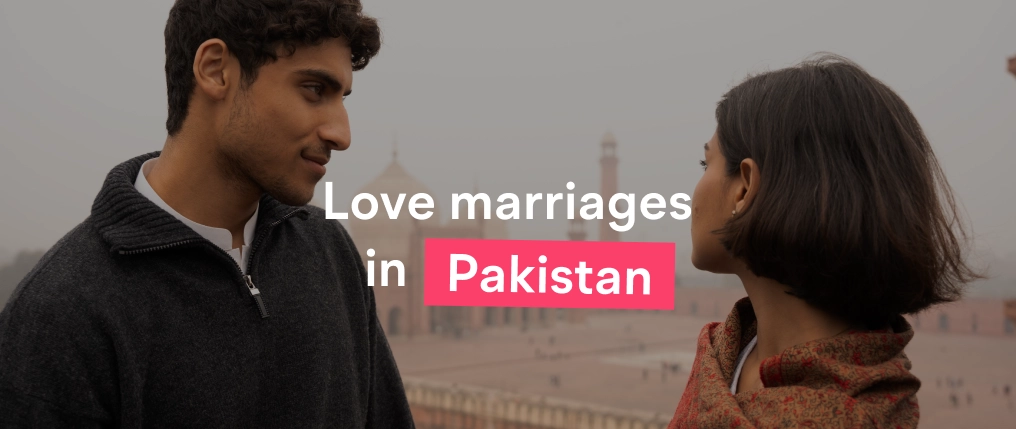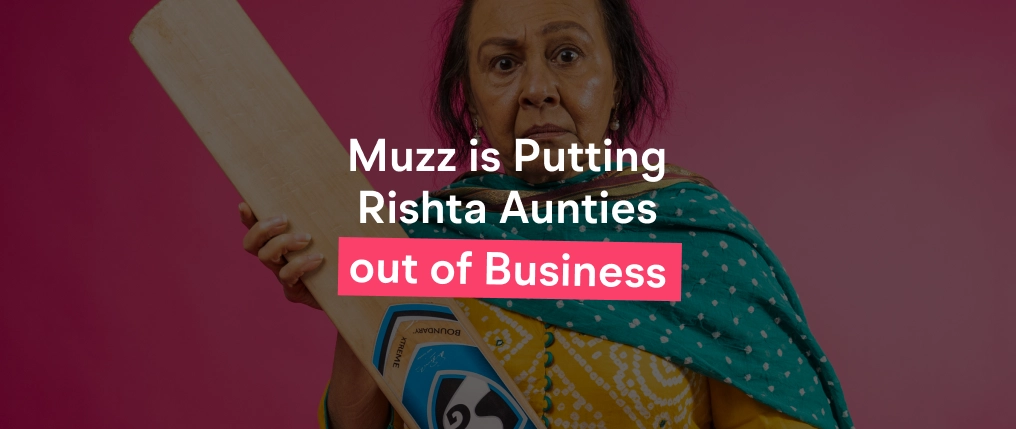
Love Marriages in Pakistan
March 12, 2024

Love marriage, as the name suggests, involves two individuals coming together based on their own feelings of affection and desire. In Pakistan, a society where arranged marriages have long been the norm, the idea of two individuals choosing each other based on love and affection challenges deeply ingrained cultural and societal norms. While love marriages are gaining traction globally, in Pakistan, they often encounter formidable resistance rooted in religious, cultural, and familial expectations.


Looking for your soulmate?
You won’t find your soulmate on this blog post but you might find them on Muzz - the world’s biggest Muslim dating and marriage app.
The notion of family honour holds immense significance in Pakistani culture, with marriages traditionally seen as a union not just of individuals but of families. Consequently, the idea of individuals independently selecting their life partners can be perceived as a breach of familial ties and cultural values. Moreover, societal pressure to conform to established norms and expectations can intensify the challenges faced by couples opting for love marriages.
Despite the hurdles, the landscape of love marriages in Pakistan is evolving, albeit gradually. As the country undergoes socio-cultural transformations, driven by factors such as urbanisation and globalisation, attitudes towards love marriages are witnessing a subtle but perceptible shift including the digitization of matchmaking.
Increasingly, young Pakistanis are challenging conventional wisdom and asserting their agency in matters of the heart, opening doors to a new era where love and tradition intersect in intriguing ways.
Table of contents
What is the difference between love marriage and arranged marriage?
Are love marriages allowed in Islam?
Love marriages and court marriages in Pakistan
Is love marriage a good option?
What are the difficulties of love marriage?
Are love marriages successful?
Love marriage or arranged marriage: which is better in Islam?
What is the difference between love marriage and arranged marriage?

Arranged marriages and love marriages represent two, often overlapping, paths to matrimony. In an arranged marriage, families hold sway in selecting a life partner for their child, often considering factors like social standing, education, and religious compatibility.
The couple may have limited prior acquaintance, necessitating effort to cultivate a fulfilling relationship over time. Despite potential challenges, arranged marriages benefit from familial support and guidance, aiding the couple in navigating the intricacies of married life.
Conversely, love marriages stem from the couple’s independent choice, rooted in mutual affection and shared values. This autonomy fosters a sense of personal fulfilment and satisfaction, underpinned by trust and respect. Yet, love marriages aren’t devoid of hurdles; cultural disparities and familial expectations can pose significant obstacles. Successfully bridging such gaps demands effective communication and compromise.
Ultimately, the efficacy of either approach hinges on individual circumstances. Compatibility, communication, and commitment remain pivotal, irrespective of the marriage type. Both partners must be prepared to collaborate, communicate openly, and offer unwavering support to cultivate a robust and gratifying relationship.
Whether bound by tradition or forged through love, the key to a fulfilling marriage lies in mutual understanding, resilience, and shared aspirations.In the Pakistani context, the distinction between arranged and love marriages is often blurred by societal norms and familial expectations. Marriage holds profound cultural significance, accompanied by elaborate celebrations and, more often than not, the customary exchange of dowry.
While arranged marriages predominate, driven by parental influence and societal pressures, love marriages are less common due to familial objections and other constraints. It is crucial to recognize that arranged marriages aren’t inherently forced marriages.
Yet, in Pakistan, the line between the two can be thin, with many arranged marriages feeling coercive, leaving both partners feeling constrained. This highlights the complex interplay between tradition, familial expectations, and individual autonomy in the Pakistani matrimonial landscape.
Are love marriages allowed in Islam?

In Islam, love marriages are permitted as long as they adhere to the principles outlined in Sharia law. Consent, a fundamental aspect of Islamic marriage, must be freely given by both parties, regardless of gender. Parents do not possess the authority to coerce their children into marriages, underscoring the importance of individual choice.
The permissibility of love marriages hinges on whether the love between the couple complies with Islamic teachings. If their affection does not lead them to transgress the bounds set by Allah, the resulting marriage is deemed more likely to be stable, rooted in the mutual desire to unite in matrimony.
The Prophet Muhammad (peace and blessings be upon him) emphasised the merit of marriage for those who love each other, underscoring its potential for stability and growth. However, if falling in love leads to illicit relationships prior to marriage, stability is compromised. Such actions contravene Sharia law and can erode the blessings and support bestowed by Allah.
Love marriages and court marriages in Pakistan

In Pakistan, the terms “love marriage” and “court marriage” are often used interchangeably, although they don’t necessarily mean the same thing. Love marriage refers to a union based on mutual affection and choice, while court marriage denotes a legal ceremony officiated by a lawyer or justice of peace, typically without the presence of a Wali.
Court marriages are recognized as a legitimate means for couples to formalise their relationship under the law, adhering to Islamic principles and constitutional rights. Couples in Pakistan tend to opt for a court marriage procedure if their chosen life partner is not accepted by their family.
In Pakistan, the Constitution upholds the right to marriage as a fundamental human right, allowing couples to exercise their autonomy and enter into an official union through court marriage. The legal framework, as outlined in the Muslim Family Laws Ordinance of 1961, ensures the protection and enforcement of the rights associated with court marriages, thereby granting couples the freedom to marry their chosen partners within the bounds of the law.
Is love marriage a good option?

When considering whether love marriage is the right option, one must weigh various crucial factors.
Firstly, it’s essential to reflect on your priorities and values in a life partner. Are you seeking shared interests, emotional connection, or considering practical aspects like family background?If cultural traditions and family input hold significance, an arranged marriage might align better. Conversely, if finding a profound romantic connection is paramount, a love marriage could be more suitable.
Secondly, partner compatibility plays a pivotal role. In an arranged marriage, compatibility is typically assessed by family and matchmakers based on cultural norms and shared values. In contrast, love marriages afford the freedom to choose a partner based on mutual attraction and long-term compatibility.
Lastly, it’s vital to consider family dynamics. Arranged marriages often involve significant family involvement, with elders playing a central role in matchmaking and marriage arrangements. On the other hand, love marriages offer more independence in partner selection, although families may still have a role in the wedding proceedings.
Ultimately, determining whether love marriage is the right option depends on aligning your preferences, values, and familial expectations with the marriage path that resonates most with you.
What are the difficulties of love marriage?

Despite its allure, love marriages are not without their challenges. One significant hurdle is navigating familial expectations and societal norms, particularly in cultures where arranged marriages are the convention.
In Pakistan, where cultural traditions hold substantial sway, opting for a love marriage can provoke resistance and disapproval from family members. This can lead to strained relationships and emotional turmoil for the couple.
Additionally, managing differing backgrounds and expectations within the relationship itself can pose difficulties. Cultural disparities, conflicting family dynamics, and divergent values may require careful negotiation and compromise.
Furthermore, societal pressures and external judgments can exacerbate stress and strain on the marital bond. Overcoming these obstacles demands resilience, effective communication, and a steadfast commitment to the relationship.
Despite the challenges, many couples find that the rewards of love marriage, including genuine connection and personal fulfilment, far outweigh the difficulties they may encounter along the way.
Are love marriages successful?

Determining the success of love marriages is a complex matter, as it depends on various factors unique to each relationship. While some may thrive, others may face challenges. Success in a love marriage often hinges on factors such as effective communication, mutual respect, and shared goals. Additionally, the ability to navigate familial expectations and societal pressures can significantly impact the longevity and happiness of the union.
Studies suggest that love marriages tend to have higher levels of satisfaction and intimacy compared to arranged marriages, as they are based on mutual affection and choice. However, success is not guaranteed solely by the presence of love; it requires ongoing effort, compromise, and dedication from both partners.
Ultimately, the success of a love marriage is determined by the commitment of the individuals involved to overcome obstacles, nurture their bond, and cultivate a fulfilling partnership built on trust, understanding, and mutual support.
Love marriage or arranged marriage: which is better in Islam?

In Islam, the question of whether love marriage or arranged marriage is preferable depends on various factors. Love marriage, where two individuals choose each other based on permissible attraction and mutual consent, is viewed favourably if it doesn’t involve transgressing Islamic limits.
The Prophet Muhammad (peace and blessings be upon him) emphasised the merit of marriage for those who love each other, suggesting that marriage strengthens the bond of love. However, marriages arising from illicit relationships are discouraged, as they may lack stability and divine blessings.
On the other hand, arranged marriages, where families play a significant role in partner selection, can be successful if the chosen partner is religious and compatible. The Prophet encouraged prospective spouses to observe each other before marriage to foster love and compatibility. However, if the choice is not suitable or lacks mutual consent, the marriage may face challenges and instability.
Ultimately, both love and arranged marriages can be successful in Islam if they are founded on mutual respect, compatibility, and adherence to Islamic principles.
Conclusion
In conclusion, the landscape of love marriage in Pakistan is complex and multifaceted, shaped by cultural traditions, societal expectations, and individual aspirations. While the concept of love marriage represents a departure from traditional norms, its acceptance and prevalence continue to grow, albeit slowly.
Whether through court proceedings or traditional ceremonies, love marriages in Pakistan embody the pursuit of happiness and fulfilment, albeit amidst cultural constraints. As the country evolves and embraces modernity, attitudes towards love marriages are shifting, paving the way for a more inclusive and accepting society.
Ultimately, the journey of love marriage in Pakistan is a testament to the enduring power of love, resilience, and the human spirit in navigating the complexities of tradition and modernity.
Latest Stories
Share this story

